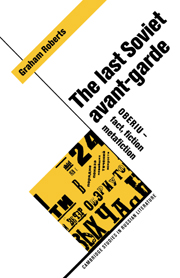Book contents
- Frontmatter
- Contents
- Acknowledgements
- Notes on transliteration and conventions
- Introduction: OBERIU – the last Soviet avant-garde
- 1 Authors and authority
- 2 Rereading reading
- 3 Language and representation
- Conclusion: OBERIU – between modernism and postmodernism?
- Notes
- Bibliography
- Index
- CAMBRIDGE STUDIES IN RUSSIAN LITERATURE
1 - Authors and authority
Published online by Cambridge University Press: 02 September 2009
- Frontmatter
- Contents
- Acknowledgements
- Notes on transliteration and conventions
- Introduction: OBERIU – the last Soviet avant-garde
- 1 Authors and authority
- 2 Rereading reading
- 3 Language and representation
- Conclusion: OBERIU – between modernism and postmodernism?
- Notes
- Bibliography
- Index
- CAMBRIDGE STUDIES IN RUSSIAN LITERATURE
Summary
THE ART OF PUBLIC SPEAKING: RUSSIAN MODERNISM AND THE AVANT-GARDE
In this chapter I shall first make a number of general comments concerning Russian modernism and the avant-garde, and its challenge to elevated notions of the artist, before discussing the nature of that challenge in OBERIU fiction.
The year in which OBERIU definitively collapsed also marks the end of the period generally referred to as ‘modernism’ (approximately 1900–30). This was an era of seemingly apocalyptic upheaval, both in Russia and in the West, during which time, in the wake of the intellectual revolution effected in the previous century by thinkers such as Darwin, Marx, and Nietzsche, all ‘truths’ were questioned, all authorities subverted. The poet Guillaume Apollinaire was speaking both literally and figuratively when he declared in 1913, ‘Hommes de l'avenir souvenez-vous de moi / Je vivais à l'époque où finissaient les rois’.
One of the ‘kings’ which a number of trends within modernism sought to do away with was the Romantic figure of the artist as an ‘inspired genius’, whose ‘creations’ are ‘original’. The modernist tendency to question such conventional, ‘elevated’ notions of art and the artist can be traced back in the West to the last years of the nineteenth century, and can be said to have culminated in the ‘Dada’ movement (1916–22), which was nothing less than an attempt to destroy art as an institution.
- Type
- Chapter
- Information
- The Last Soviet Avant-GardeOBERIU - Fact, Fiction, Metafiction, pp. 22 - 74Publisher: Cambridge University PressPrint publication year: 1997

